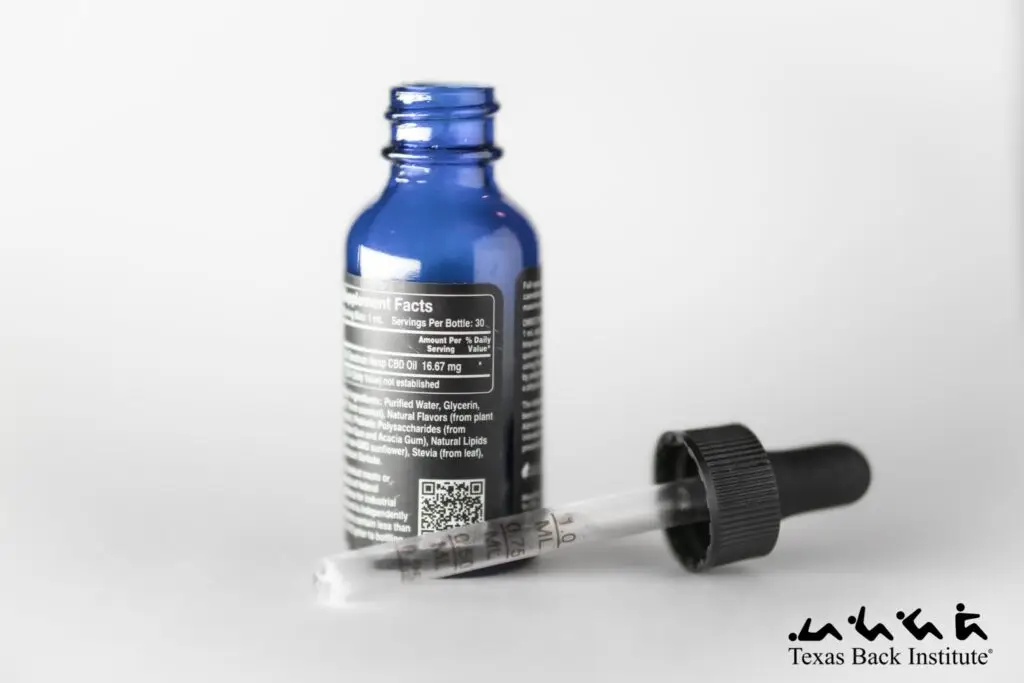Written by Dr. Peter Derman
Cannabidiol, also known as CBD, is a substance derived from the Cannabis plant that has recently exploded in popularity as a natural remedy for a variety of ailments. Patients frequently ask me about the safety and purported benefits of CBD for spine-related issues. Read on for a synopsis of what you should know prior to using CBD-containing products.
What is CBD?
Cannabis, a group of flower plants, has been grown and used by humans for thousands of years. It contains numerous naturally-occurring chemicals, called cannabinoids, each with unique properties. Delta 9-tetrahydrocannabinol (THC) is the main psychoactive component of Cannabis and produces the “high” associated with marijuana. CBD, on the other hand, does not cause these mind-altering effects but may have desirable properties. Strains of Cannabis with low THC content (less than 0.3%) are considered hemp, while varietals with higher amounts of THC are classified as marijuana.
How does it work?
The human body has a receptors for cannabinoids located in numerous tissues including the central and peripheral nervous systems, immune tissues, and bone. Scientists have not yet fully characterized the mechanism of action for CBD, but it seems to indirectly affect the cannabinoid system. It also binds to dopamine, opioid, and serotonin receptors and may therefore modulate pleasure, pain and mood.

Is there good evidence that CBD is effective for treating spine-related issues?
Not presently. The majority of research to date has focused on THC, and the scientific community has not yet produced sufficient data on CBD. Currently available information on CBD for spine problems must be gleaned from the results of mouse and rat studies because rigorous scientific testing in people has not been performed. Given the recent surge in interest among the general public, the US government recently announced $3 million in research grants to focus on CBD studies.
Those animal studies demonstrate some promising results, however. CBD use has been shown to be protective against disc degeneration, spinal cord injury, arthritic pain, and post-surgical pain. It may promote bone healing after fractures and increase bone density. While these findings are intriguing, caution must be exercised when extrapolating these results to humans, and dedicated studies in people are necessary to truly establish the effectiveness of CBD.
Is it safe?
CBD use appears to be fairly safe in most instances. Studies show that it does not produce a “high,” alter physiologic parameters (e.g., blood pressure, body temperature, heart rate), or produce withdrawal symptoms. It is not believed to be addictive. However, it has been associated with sleepiness, diminished appetite, and diarrhea. Because CBD is processed through the liver, it may produce abnormal liver function tests and can affect the metabolism of medications. One such drug is the blood thinner warfarin, which can produce dangerous bleeding if levels are not kept within a safe range. It is therefore advisable to consult with your internist prior to trying CBD to ensure that there are no medication interactions or other medical reasons to avoid it.
Is it legal?
The short answer is: maybe. CBD falls into a regulatory gray zone. Hemp-derived CBD was removed from the list of federally controlled substances in 2018. While the use of CBD is not forbidden by the federal government, it cannot be marketed as a medication or dietary supplement except in the case of Epiodiolex, an anti-seizure medication that is the only CBD-based treatment currently approved by the United States Food and Drug Administration (FDA). The FDA has sent numerous warning letters to CBD retailors making unsubstantiated medical claims.
Some states have their own laws regarding CBD, and it is currently completely prohibited in South Dakota, Idaho, and Nebraska. To complicate things further, buying and selling CBD-containing products across state lines is forbidden, which may affect online purchasing.
Will it cause me to fail a drug test?
Use of CBD could result in a positive drug test because even hemp-derived CBD products may contain small amounts of THC (or even relatively high quantities if there has been contamination with THC from marijuana-derived products). The best way to minimize this risk is to purchase from reputable vendors and to only use products with a Certificate of Analysis confirming that the product contains no THC. For any current or aspiring professional athletes out there… CBD was recently removed from the World Anti-Doping Agency’s list of banned substances for international competition.
The bottom line
While encouraging early results have been observed in animal studies of CBD for spine-related problems, there is not currently enough data to advocate for human use in this setting. The chance of serious side effects from CBD seems relatively low. People who want to try it are therefore likely not putting themselves at significant risk but should discuss with their internists prior to starting CBD to ensure that it is safe to do so.
*Please note, communication or information on this site does not create a physician/patient relationship. Any tips or suggestions given on this page should be discussed with your physician before attempting.



Great overview of CBD’s potential for spine-related conditions and the current research limitations. The safety insights are especially helpful for those considering CBD use.
“Really informative article—thanks for breaking down the science and safety considerations of CBD for spine-related issues. I’ve been using CBD from Green Herbal Care for a few months to help with general pain and inflammation, and I’ve noticed a real improvement in my daily comfort and mobility. Their oils and gummies are easy to use, and I feel confident knowing the products are high-quality and lab-tested. For anyone curious about trying CBD safely and consistently, Green Herbal Care has been a reliable option for me.”